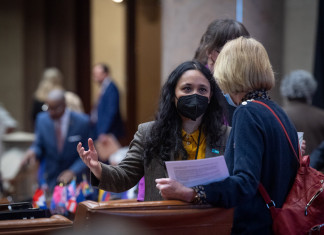On April 25, I participated in a panel discussion at Rhinebeck High School for students and parents to learn about the “Social Host Law,” a relatively new county law that police have been using to crack down on teen drinking.
The Social Host Law, formally known as Dutchess County Local Law No. 2 of 2008, states that it “shall be unlawful for any person over the age of 18, who owns, rents or otherwise controls a ‘residence’ … or ‘dwelling’ … to knowingly allow the consumption of alcohol or alcoholic beverages, by any minor on such premises.”
The law defines “knowingly” as “aware of, or having reason to be aware of, the consumption of alcohol by a minor.” That means that even if your parents don’t supply the alcohol but they “have reason” to be aware of underage drinking at their house, they could be arrested and charged with a criminal violation. The penalties for violating the Social Host Law include a $250 fine and/or up to 15 days in jail for the first offense, a $500 fine and/or up to 15 days in jail for the second offense; and a third offense is deemed a misdemeanor with up to a $1,000 fine and/or up to one year in jail. New York does not have an expungement statute, so if a person is convicted of a misdemeanor, he or she will have a criminal record forever.
In addition to the Social Host Law, if police come upon a party at which they suspect minors are being served alcohol, they will charge any minors consuming alcohol with “Unlawful Possession of Alcohol,” which carries a fine and the possibility of jail. Minors who use a “fake ID” to obtain alcohol can also be charged with “Possession of a Forged Instrument,” which is a felony that could land you in state prison. Most commonly, when the police “crash” a party at which minors are drinking alcohol, the person supplying or permitting the alcohol to be served to minors will be charged with “Endangering the Welfare of a Minor,” which is a misdemeanor punishable by up to a year in jail, and/or “Unlawful Dealing With a Child,” which is also a misdemeanor punishable by up to a year in jail.
Just like the Social Host Law, the person supplying or permitting, the alcohol to minors does not have to be present at the party to be charged.
The police may charge some or all of these criminal offenses depending on various factors, like the age of the minors drinking and the age of the person who supplied or permitted the alcohol.
There are far more serious felony offenses, like “Criminally Negligent Homicide” or “Reckless Endangerment,” if someone dies from alcohol poisoning or a minor gets drunk at your house and then drives off and kills or injures another person.
In addition to any fines and court surcharges, the attorney fees required to defend against these types of charges can be substantial.
Also, you need to know that, apart from the consequences under the criminal law, a homeowner can be held civilly liable (sued for money) for any damages caused by a minor who drinks at his party. Damages include injuries sustained by the minor and additional compensation is allowed for property damage, medical bills, and any pain and suffering caused by an inebriated minor to third parties.
Moreover, homeowners insurance will mostly likely not pay for the damages caused by a minor who has been drinking because insurance companies routinely disclaim payment for any damages caused by intentional acts that are classified as crimes or criminal violations.
So if you are thinking about hosting a party this prom season, skip the alcohol and serve soft drinks. It’s just not worth the high price you and your parents will pay if someone calls the police and they show up at your door.
Michael S. Pollok has been a criminal defense lawyer for 20 years and has law offices located in Red Hook and Kingston.







Facebook Comments